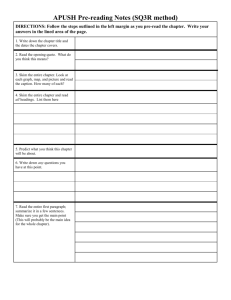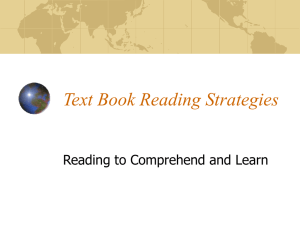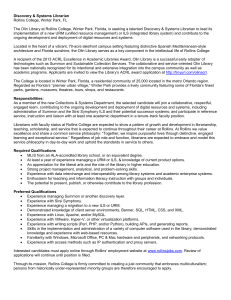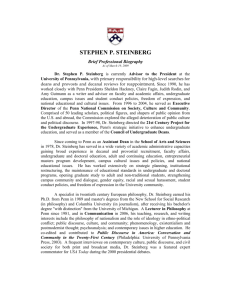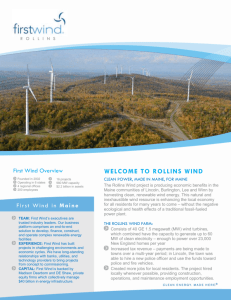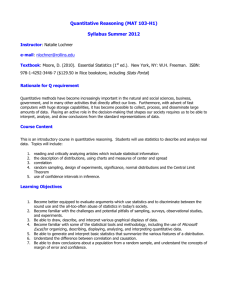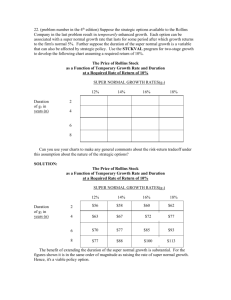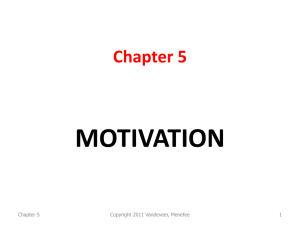Sustainable Development in Practice
advertisement
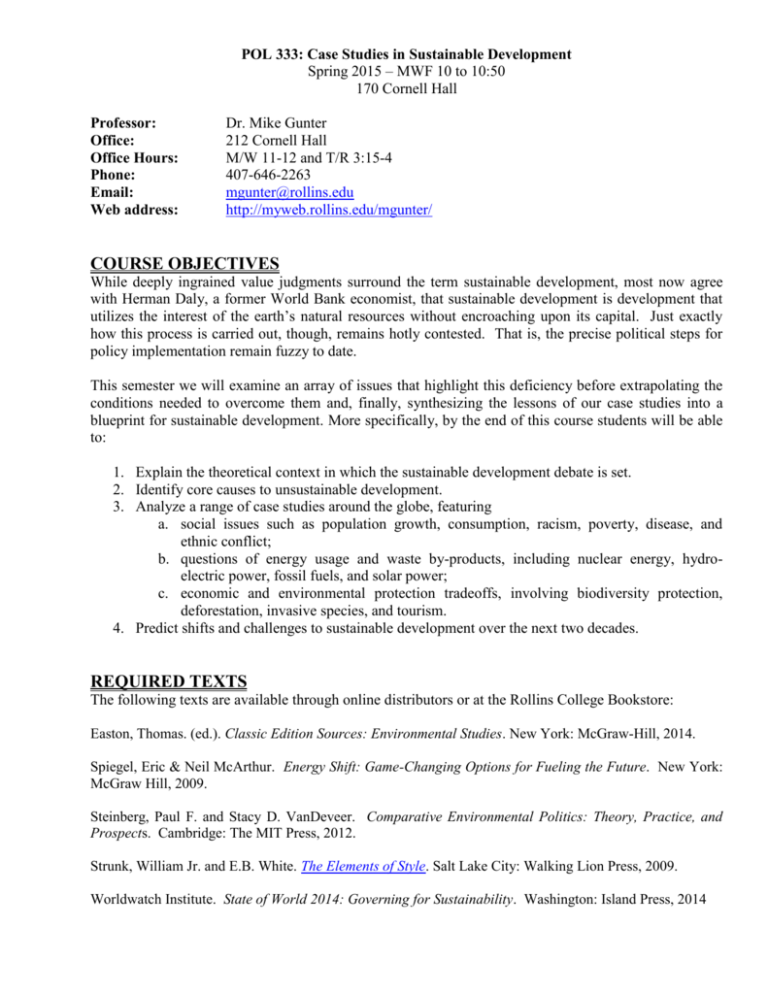
POL 333: Case Studies in Sustainable Development Spring 2015 – MWF 10 to 10:50 170 Cornell Hall Professor: Office: Office Hours: Phone: Email: Web address: Dr. Mike Gunter 212 Cornell Hall M/W 11-12 and T/R 3:15-4 407-646-2263 mgunter@rollins.edu http://myweb.rollins.edu/mgunter/ COURSE OBJECTIVES While deeply ingrained value judgments surround the term sustainable development, most now agree with Herman Daly, a former World Bank economist, that sustainable development is development that utilizes the interest of the earth’s natural resources without encroaching upon its capital. Just exactly how this process is carried out, though, remains hotly contested. That is, the precise political steps for policy implementation remain fuzzy to date. This semester we will examine an array of issues that highlight this deficiency before extrapolating the conditions needed to overcome them and, finally, synthesizing the lessons of our case studies into a blueprint for sustainable development. More specifically, by the end of this course students will be able to: 1. Explain the theoretical context in which the sustainable development debate is set. 2. Identify core causes to unsustainable development. 3. Analyze a range of case studies around the globe, featuring a. social issues such as population growth, consumption, racism, poverty, disease, and ethnic conflict; b. questions of energy usage and waste by-products, including nuclear energy, hydroelectric power, fossil fuels, and solar power; c. economic and environmental protection tradeoffs, involving biodiversity protection, deforestation, invasive species, and tourism. 4. Predict shifts and challenges to sustainable development over the next two decades. REQUIRED TEXTS The following texts are available through online distributors or at the Rollins College Bookstore: Easton, Thomas. (ed.). Classic Edition Sources: Environmental Studies. New York: McGraw-Hill, 2014. Spiegel, Eric & Neil McArthur. Energy Shift: Game-Changing Options for Fueling the Future. New York: McGraw Hill, 2009. Steinberg, Paul F. and Stacy D. VanDeveer. Comparative Environmental Politics: Theory, Practice, and Prospects. Cambridge: The MIT Press, 2012. Strunk, William Jr. and E.B. White. The Elements of Style. Salt Lake City: Walking Lion Press, 2009. Worldwatch Institute. State of World 2014: Governing for Sustainability. Washington: Island Press, 2014 ADDITIONAL REQUIRED READING In addition to the above texts, there are a handful of reserve readings (RR) either at the Olin Library or listed with hyperlinks in our tentative course schedule below. You may access these through our online syllabus or the Olin Reserve desk online with the password “gunter”. You should also monitor current events as they relate to sustainable development. I recommend weekly reading of the international sections of a national daily newspaper such as The New York Times, The Washington Post, or The Wall Street Journal. The New York Times, for example, offers its Green Blog as well as a “Science Times” section in its Tuesday editions. A few other recommended national US papers you may wish to consult are The Christian Science Monitor, The Boston Globe, The Chicago Tribune, The Miami Herald, and The Los Angeles Times. See World-Newspapers.com for links to English-language newspapers and magazines around the globe. Non-traditional sources can also be a good source of news. Along these lines, some blogs of note for our purposes are the Council on Foreign Relations, The Economist’s Free Exchange, Financial Times’ The World, Foreign Policy Association’s Global Affairs Blog Network, Foreign Policy’s Passport, and PBS’s Wide Angle Blog. Utilizing these sources, most Fridays, we will start out class with a presentation and peer-led discussion of an unfolding news item that week. More on this assignment follows later in the syllabus. COURSE EXPECTATIONS The prerequisite for this course is either POL 100 or POL 130. Participation in class is expected, especially since we have the luxury of a small seminar environment. Material discussed in class will appear on exams and other assignments. As outlined below, participation will play a key role in determining final grades, especially borderline cases. We have a combination of texts and shorter readings to guide class discussions in this regard. Please be advised that the reading load is heavy at times and requires a substantial time commitment outside of class meetings. As your Rollins College Catalogue warns, you should anticipate spending an average of three hours outside of class for every hour spent in class. I recommend that you carefully look over the course materials and decide how much time you are willing to invest before committing yourself to this class. Diligently keeping on schedule with your reading load will allow you to take full advantage of our discussions and exercises. Be sure to come to class prepared and ready to actively participate on a regular basis. Your participation grade sheet later in the syllabus details how crucial this aspect of the course is. There will also be several writing assignments as well as two essay exams in this course. Of all that you learn in college, writing is one of the most important. Regardless of your career goal, you will need to develop the skill of writing well. Writing helps you learn. It focuses your thoughts and forces you to organize them. For general guidance on writing style, we will read the age-old pamphlet by William Strunk and E.B. White, The Elements of Style, during the first week of the semester. It is available for purchase at the Rollins College bookstore or free online at: http://www.bartleby.com/141/index.html. I will assume all written submissions follow the guidelines outlined in this text. Finally, as upper division college students you are already familiar with the term plagiarism. Remember, any work that borrows wording, ideas, or even organization from another source without appropriate acknowledgment is defined as plagiarism. A general rule of thumb is to cite any phrase that is not common knowledge and longer than four words. Please note the penalty for violating this rule is severe. 2 GRADING POLICY: Feel free to consult me about any of your work and grades during the semester, i.e. papers, participation, quizzes, exams, etc. Due to privacy concerns, however, grades will not be discussed electronically at any time during or after the semester. Per the Rollins College Catalogue, the grade report is based on the following definitions: A is reserved for work that is exceptional in quality and shows keen insight, understanding, and initiative. B is given for work that is consistently superior and shows interest, effort, or originality. C is a respectable grade required for graduation; it reflects consistent daily preparation and satisfactory completion of all work required. D- is the lowest passing grade; it is below the average necessary to meet graduation requirements and ordinarily is not accepted for transfer by other institutions. F is failing. Grading is based upon percentages that equate to the standard +/- system below: A B C D = 93 % and up = 83-86 = 73-76 = 63-66 ABCD- = 90-92 = 80-82 = 70-72 = 60-62 B+ = 87-89 C+ = 77-79 D+ = 67-69 F = 59 and below Unless another due date is announced in class, you are responsible for turning in assignments on time before class starts. This responsibility comes in two parts. For one, you must turn in a hard copy of your paper to me. For another, you must submit an electronic copy to www.turnitin.com. Our class ID is “9170606” and the class password is “honor.” Let me know if you need any help with this but do be sure to complete this requirement if you wish to receive credit for your paper. After class begins, assignments will be considered late so do not skip class just to finish an assignment. Late assignments will be accepted until 4 p.m. that day with one letter grade penalty. After the due date, papers will not be accepted. Make-up tests are not given, except under extenuating circumstances, i.e. illness, death in the family, religious holiday. In these cases the professor must be informed prior to the exam or assignment due date. Do this either in-person, email, or telephone. GRADING DISTRIBUTION: NGO Grant Proposal Case Study Editorial Current Event PowerPoint Participation Midterm Exam Final Exam 10% 10% 10% 25% 20% 25% 3 TENTATIVE COURSE SCHEDULE Part I Theoretical Context & International Framework Week 1: Jan. 12/14/16 Definitions and Design: What is Sustainable Development? RR: World Commission on Environment and Development. Our Common Future, Part I: Common Concerns, Chpt 2: Towards Sustainable Development, pp. 43-66 The Limits to Growth Easton: Selections 7 (Garrett Hardin), 14 (William Douglas), 15 (William Cronon) Strunk & White: 1st half Steinberg & VanDeveer 1 The American Experience: Rachel Carson’s Silent Spring Strunk & White: 2nd half Introduction to Silent Spring by Al Gore (skim also: http://www.rachelcarson.org/) Week 2: Jan. 19/21/23 MLK Jr. Holiday Comparative Politics and the Environment Steinberg & VanDeveer 2 The Demand for Energy Spiegel & McArthur 1, 2 Current Event Report #1 Week 3: Jan. 26/28/30 Perceptions of the Environment Easton: Selections 2 (John Muir), 3 (Gifford Pinchot), 4 (Aldo Leopold) Steinberg & VanDeveer 3 Does Size Matter? RR: Skim Schumacher Part I - Chpts.2, 3, 4, 5 Paul Wapner, “World Summit on Sustainable Development: Toward a Post-Johannesburg Environmentalism,” Global Environmental Politics, vol.3:1 (2003), pp.1-10 Failing Governance? Worldwatch 1 Current Event Report #2 Week 4: Feb. 2/4/6 Population Growth vs. Consumption Easton: Selection 25 (Lester Brown), 33 (Dave Foreman), 35 (Joel Cohen) Steinberg & VanDeveer 4 NGO Pre-Proposal due in class (hard copy only) 4 NGOs and Civil Society Worldwatch 4 Joseph S. Nye, “The Rising Power of NGO’s,” The Daily Times (Pakistan), 31 Aug. 2004: Final NGO Grant Proposals due in class (both hard copy & electronic) Oil’s Production Plateau Spiegel & McArthur 3, 4 Current Event Report #3 Part II Sustainable Development in Practice Week 5: Feb. 9/11/13 The Politics of Scarcity, Mapping Worldviews on Sustainable Development Easton: 31 (Robert Bullard) Clapp, Jennifer and Peter Dauvergne. Paths to a Green World: The Political Economy of the Global Environment. Cambridge: The MIT Press, 2011, Chpt 1. Steinberg & VanDeveer 5 The Pollution of Poverty: Hispaniola Case Study RR: Mabogunje, Akin L. “Poverty and Environmental Degradation: Challenges within the Global Economy,” Environment, January/February 2002 Skim Central Intelligence Agency, “Dominican Republic” & “Haiti,” The World Factbook Coal’s Questionable Future Spiegel & McArthur 5 Current Event Report #4 Week 6: Feb. 16/18/20 Frontline: Ghosts of Rwanda Skim Central Intelligence Agency, “Rwanda,” The World Factbook: Steinberg & VanDeveer 6 Ethnic Conflict in Rwanda Samantha Power, “Never Again: the World’s Most Unfulfilled Promise” RR: Gourevitch, Philip. We Wish to Inform You that Tomorrow We Will Be Killed with Our Families: Stories from Rwanda, Picadur, 1999, Chpt. 4. Kuish, Nicholas. “Rwanda Reaches for New Economic Model,” The New York Times, 23 March 2014 The Promise of Natural Gas Advancing Ecological Stewardship via Human Rights Spiegel & McArthur 6 Worldwatch 9 Current Event Report #5 Week 7: Feb. 23/25/27 Midterm 5 Oil Addiction Triangle: Energy Climate Security & Terrorism Easton: Selection 23 (IPCC) Frontline: Climate of Doubt (23 Oct. 2012) 53:47 Spiegel & McArthur 7 Skim timeline on U.S. climate change politics Sara Bernard. “This graphic novelist tells the true story of climate change,” Grist, 17 Oct 2014 Week 8: Spring Break Week 9: March 9/11/13 Reducing Your Carbon Footprint (bring laptop to class) Steinberg & VanDeveer 7 UC Berkley’s Cool Climate Network Carbon Footprint Calculator Skim Carbon Footprint Calculator & The Nature Conservancy’s “What’s My Carbon Footprint?” Dam Development: The Gabcikovo Dispute RR: John Fitzmaurice, Damming the Danube: Gabcikovo and Post-Communist Politics in Europe, Westview Press, 1996, pp. 1-25 Slovakia.org: The Guide to the Slovak Republic. “Gabcikovo Dam Dispute” Spiegel & McArthur 8 Frontline: Inside Japan’s Nuclear Meltdown (28 Feb. 2012) 54:40 Week 10: March 16/18/20 The Aral Sea Sandra Akmansoy, & Daene C. McKinney, “Aral Sea Water Rights” RR: “Crossing the Oxus – Destruction of the Aral Sea in Uzbekistan,” Afterimage, Sept. 2001 Steinberg & VanDeveer 8 Approaching the Energy Shift Spiegel & McArthur 9 *Thursday Evening Winter Park Institute Speaker Eric Spiegel 7 pm @Tiedke Concert Hall, Keene Music Building Friday class session with Mr. Eric Spiegel, President & CEO of Siemens USA, pending Week 11: March 23/25/27 Case Study Editorial Work Session The Black Triangle Bruce Stutz, “Europe’s Black Triangle Turns Green,” OneEarth (NRDC Magazine), Spring 2005 RR: Earthwatch Expedition Briefing handout Steinberg & VanDeveer 9 Looking Backward, Not Forward, to Environmental Justice 6 Worldwatch 10 Current Event Report #6 Week 12: March 30/April 1/3 Film: The Lorax Development & Deforestation in the Amazon Steinberg & VanDeveer 10 Skim Tambopata Macaw Project Elizabeth Royte, “35 Who Made a Difference: An Ethnobotanist Takes Up the Cause of Rainforest Conservation,” Smithsonian, Nov. 2005 Frontline: Ebola Outbreak (9 Sept. 2014) 27:26 The American Experience: Influenza 1918 RR: Gro Harlem Brundtland, “The Globalization of Health,” Seton Hall Journal of Diplomacy and International Relations, vol. IV:2 (Summer/Fall 2003), pp.7-12. Case Study Editorials due in class (hard copy & electronic) China’s Environmental Governance Challenge Worldwatch 12 Current Event Report #7 Week 13: April 6/8/10 Infectious Disease Steinberg & VanDeveer 11 Jeffrey E. Stern. “Hell in the Hot Zone,” Vanity Fair, October 2014. Is It Time for a New Ark? Skim CBD Secretariat homepage RR: Bright, Christopher. “Invasive Species: Pathogens of Globalization,” Foreign Policy, Fall 1999: 50-64. Climate Governance and the Resource Curse Worldwatch 11, 17 Current Event Report #8 Week 14: April 13/15/17 Trade and the Environment: GATTzilla vs. Flipper World Trade Organization, “Environment: Disputes - Mexico etc. versus US,” 3 Sept. 1991 Skim Marine Mammal Protection Act via NOAA Fisheries Office of Protection Resources RR: Thomas L. Friedman, “Senseless in Seattle,” New York Times, 1 Dec. 1999 RR: Thomas L. Friedman, “Senseless in Seattle II,” New York Times, 8 Dec. 1999 Steinberg & VanDeveer 12 Tourism vs. Eco-tourism: The Galapagos Islands RR: Martha Honey, “Treading Lightly?” Environment, vol. 41:5 (1999): 4-9 Skim Charles Darwin Research Station webpage Working Toward Energy Democracy 7 Worldwatch 20 Current Event Report #9 Part III Conclusions Week 15: April 20/22/24 Developing Indicators to Sustainable Development: Paths to a Green World Steinberg & VanDeveer 13 World Bank. “Doing Business: Economy Rankings” Yale University, “Environmental Performance Index,” 2014 A Global Marshall Plan Michael Shellenberger and Ted Nordhaus, “The Death of Environmentalism: Global Warming Politics in a Post-Environmental World,” Grist Magazine, Jan. 13, 2005 A Call to Engagement Worldwatch 22 Additional Current Event Report? Week 16: April 27 Redefining Security Steinberg & VanDeveer 14 Kofi Annan, “Nobel Lecture,” 10 Dec. 2001 Review assignment due midnight before class via email (see assignments webpage for details) Final Exam: 2 pm Friday, May 1st * Please note changes in this schedule may be necessary as we progress through the semester. Any such changes will be announced in class. Also check for periodic updates on the course website, particularly the online version of the syllabus. 8 THE ACADEMIC HONOR CODE Membership in the student body of Rollins College carries with it an obligation, and requires a commitment, to act with honor in all things. Because academic integrity is fundamental to the pursuit of knowledge and truth and is the heart of the academic life of Rollins College, it is the responsibility of all members of the College community to practice it and to report apparent violations. The following pledge is a binding commitment by the students of Rollins College: The development of the virtues of Honor and Integrity are integral to a Rollins College education and to membership in the Rollins College community. Therefore, I, a student of Rollins College, pledge to show my commitment to these virtues by abstaining from any lying, cheating, or plagiarism in my academic endeavors and by behaving responsibly, respectfully and honorably in my social life and in my relationships with others. This pledge is reinforced every time a student submits work for academic credit as his/her own. Students shall add to all papers, quizzes, tests, lab reports, etc., the following handwritten abbreviated pledge followed by their signature: “On my honor, I have not given, nor received, nor witnessed any unauthorized assistance on this work.” Material submitted electronically should contain the pledge; submission implies signing the pledge. DOCUMENTATION & PLAGIARISM Here are a few simple rules about quotations, paraphrases, and plagiarism: 1. 2. 3. “When you copy the words of another, put those words inside quotation marks, and acknowledge the source with a footnote.” “When you paraphrase another's words, use your own words and your own sentence structure, and be sure to use a footnote giving the source of the idea.” “A plagiarist often merely changes a few words or simply rearranges the words in the source.” Source: Harbrace College Handbook, p. 407 Plagiarized work will result at the very least in a grade of “0” on the paper assignment and be reported to the Dean’s Office, as per college policies. 9 Participation Grades Strong daily participation is critical to the success of this course. This is the reason participation counts as such a significant percentage of your final grade. Emphasizing participation in this course also demonstrates the extent to which classroom time should build on our readings. And it reflects my belief that you will learn from one another in this class, just as you will learn from me. To receive a good participation grade one must come to class well prepared, completing all readings and assignments before our meeting time. You may find it helpful to make a rough outline of the day’s readings and/or jot down an intriguing question or two that arose from the readings. Each day I will assign a possible 10 points for your participation. Be aware that quality counts more than quantity in this calculation. You do not need to dominate the conversation. In fact doing so will detract from your grade. Don’t worry I will let you know before this happens. Students earn points in the following manner: 5 points for attending class 1 more point for being on time And 1-4 more points for quality of participation o A level participation gets 3 or 4 points o B level gets 2 points o C level gets 1 point Finally, let me outline the absence policy for this course. If you must miss class for some reason, i.e. illness, athletic competition, job interview, please let me know in advance. That means before class starts. As long as you meet this requirement you are allowed two such excused absences. NGO Grant Proposal The Gunter Foundation announced today its annual application deadline for grants. When he retired, Dr. Gunter, an eccentric former college professor from a distinguished liberal arts college in central Florida, established the foundation to foster a myriad of sustainable development initiatives across the globe. Competition has become intense over the last several years not only because this is one of the few foundations with broad parameters in the qualifications for grantees but also because a large number of Dr. Gunter’s former students match the awards dollar for dollar - and generate intense international media coverage as a result. Your task, in strictly 750 to 800 words (include this word count at the top of your paper), is to explain the central purpose of your NGO, what distinguishes it from other groups, what you intend to do with the funds, and how receiving the Gunter Grant will make a difference to the community in which you work. Typed preliminary 250 to 300-word descriptions of the NGO you select are due in class the last class before the final grant application due date. Be prepared to address the class on this day with strengths and weaknesses of your group, which means you need to do some background research on your group – including how others perceive your NGO. Grades will be based upon content, structure, and creativity. The A review meets all four criteria below, the B review three, etc. These criteria are: 10 1. 2. 3. 4. Highlights an effective thesis statement. Supports critical contentions with adequate evidence and specific examples. Shows imagination and creativity in individual insights. Is well-organized, stylistically effective, and mechanically sound (see Strunk and White’s The Elements of Style). Case Study Editorial This is an editorial assignment of 500 to 750 words – with a strict word limit (note your final word count at the end of the submitted work with your name). Your task is to construct an argument around some aspect of a specific case of unsustainable development. This should not be a summary, but an analysis that references course material when appropriate. The important point is that you construct a political argument about an issue of sustainable development using ample supporting evidence and examples. This is not merely an opinion piece, then; it is a wellreasoned argument that mimics the best of editorial pages in national publications, i.e. here’s an example from a worthy regional paper arguing for more Americans to travel abroad. As usual grades will be based upon content, structure, and creativity. The A review meets all four criteria below, the B review three, etc. These criteria are: 1. 2. 3. 4. Highlights an effective thesis statement. Supports critical contentions with adequate evidence and specific examples. Shows imagination and creativity in individual insights. Is well-organized, stylistically effective, and mechanically sound. Additional consideration will be given to those that publish their work. One place to start here is with the New Voices section of the Saturday edition of the Orlando Sentinel, 1 which publishes college students on topics ranging from foreign affairs to school life. Another is your own student newspaper, The Sandspur. Current Events PowerPoint Assignment This five-minute presentation (plus another five minutes anticipated in discussion) of a case study in sustainable development represents 10% of your final grade. Using PowerPoint format, most Fridays, one of you will start out class with a short presentation and peer-led discussion of an unfolding issue (pre-approved by the professor) related to sustainable development. After presenting your material, you will solicit critical discussion amongst your peers, specifically through the preparation of at least two engaging questions that push further exploration of the work and connect to other aspects of the course. You are also required to email your selected article to our class by 4 pm the day before your presentation. This can be done through the email lists function on Foxlink. See me or the Rollins College IT department if you have any questions on this. In terms of your grade, beyond the Email essays of about 600 words to newvoices@orlandosentinel.com. Include a high-resolution JPEG picture of yourself. 11 1 requirements outlined above, the details below are the scoring rubric I will use. The A report successfully employs each of these five components, whereas the B report incorporates four of the five, and the C report three of the five, etc. Finally remember to fill out the top five lines of the following page, submit that grading sheet the day of your presentation, check out an attachment device (dongle) from Olin Circulation if you will present with a Mac, and arrive five minutes early to class to set up your presentation. Scoring Rubric Content 1. Introduction -- tell us why you think your topic is important AND interesting 2. Established knowledge base -- what are the fundamental facts the rest of the class needs in order to understand your topic -- remember your time constraints demand a concise approach here -- the five w’s of reporting may serve as your guide: who, what, when, where, and why/how 3. Conceptual orientation and cohesion -- this is often the difference between an A and a B report -- tell the class how your current event report relates to a concept we have discussed in class -- your event may either support or challenge an existing theory, but be explicit here 4. Critical analysis -- here is your chance to shine and, again, this point also often distinguishes A from B work -- what suggestions or predictions do you offer 5. Conclusions -- brief summary of the situation…and the prospects for its resolution Delivery I encourage you to incorporate the following delivery suggestions as you prepare your presentation. They will not make a letter grade difference, but instead factor into the +/- scale, i.e. separate an A from an A-. In addition to simply improving your message (because delivery really does count in politics), addressing these items should also make you more comfortable during the actual presentation. 1. The tone of your voice literally and figuratively sets the tone for your topic. 2. Eye contact is important. Notes are a good guide, but avoid reading from your notes for prolonged periods. 3. Gestures and facial expressions can add further emphasis to the words you choose to convey your message. 4. Similarly, the use of silence can often have an important impact. 5. And finally, there is no substitute for enthusiasm. Why should the audience care if even the speaker does not feel this is an interesting topic? 12 Oral Current Events Report – fill out top 5 lines yourself Name: Topic: Points of emphasis: Presentation date: Emailed to class date: Content 1. Competence in factual background information /5 /25 2. Relevance to class, including conceptual orientation and cohesion /25 3. Critical analysis /25 4. Presentation effectiveness (introduction/conclusion/delivery/supplementary materials) /20 Total Grade: 13
